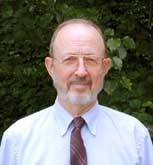April 19, 2012
National Academy of Science member to present the Theodore L. Hopkins Distinguished Colloquium in Entomology
Submitted by Gregory Zolnerowich

James H. Tumlinson, a member of the National Academy of Science, and the Ralph O. Mumma professor of entomology and director of the Center for Chemical Ecology at Penn State, is this year’s speaker for the Theodore L. Hopkins Distinguished Colloquium which is sponsored by the K-State department of entomology. He will present a seminar titled "Why do Insect Herbivores Produce Elicitors of Plant Volatiles?" at 1:30 p.m. Friday in Room 123 of the Leadership Studies Building.
Tumlinson was elected to the National Academy of Science in 1997. He is also a fellow of the Entomological Society of America and is in the U.S. Department of Agriculture-Agriculture Research Service Hall of Fame. umlinson received his doctorate in organic chemistry from Mississippi State University in 1969, where he also received his master of science in 1966. He earned a bachelor of science in chemistry from Virginia Military Institute in 1960. Tumlinson began his career as a USDA-ARS research chemist. Prior to taking his current position in 2003, Tumlinson was research leader, USDA-ARS Center for Medical, Agricultural and Veterinary Entomology, formerly the Insect Attractants, Behavior and Basic Biology Research Laboratory, in Gainesville, Fla., for 30 years and an adjunct faculty member in the University of Florida department of entomology and nematology, and department of chemistry.
Tumlinson counts among his numerous awards and honors the Burdick and Jackson International Award for Research in Pesticide Chemistry from the American Chemical Society; the J.E. Bussart Memorial Award from the Entomological Society of America for research accomplishments in the area of insect semiochemicals and associated behavior; the Kenneth A. Spencer Award for Outstanding Achievement in Agricultural and Food Chemistry; the Jean-Marie Delwart Foundation International Prize for chemical communication; and, most recently, the Wolf Prize in Agriculture.
Tumlinson has done pioneering work on chemical communications between plants and insects, including volatile signals that attract natural enemies of insect pests of plants. He is a world leader in characterizing pheromones from diverse insect species and turning basic discoveries on chemical communications into novel insect management strategies. His laboratory has identified insect pheromones and other semiochemicals, investigated the biochemical mechanisms by which chemical signals are produced and released by insects, and studied the behavioral responses, including learned responses, of insects to chemical cues. More recently, they have been investigating the interactions among herbivorous insects, their host plants, and their natural enemies. They found that plants damaged by feeding caterpillars synthesize and release volatile chemicals. Small wasps use these released volatiles as cues to locate and parasitize the caterpillars. The chemical defenses of the plant are also induced by a compound in caterpillar oral secretions, which they identified and named volicitin.
The Hopkins Colloquium was established in 1998 to honor Theodore L. Hopkins, professor emeritus, for his many contributions to the science of entomology.
